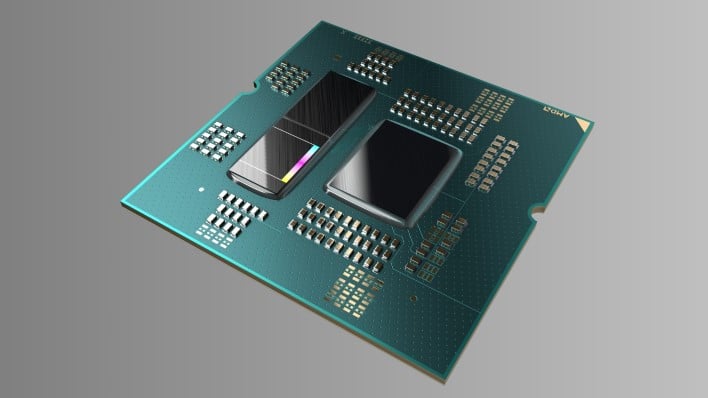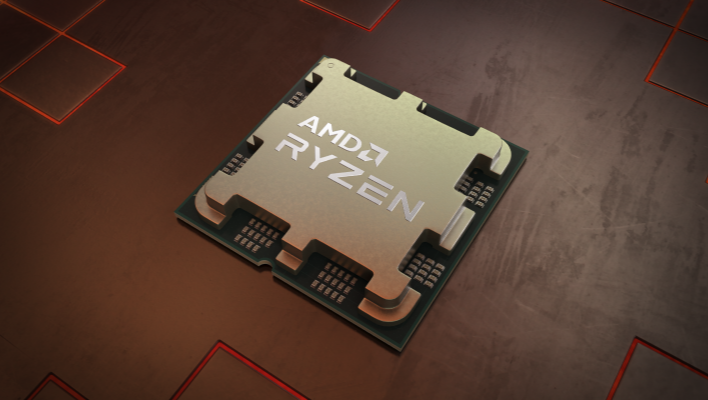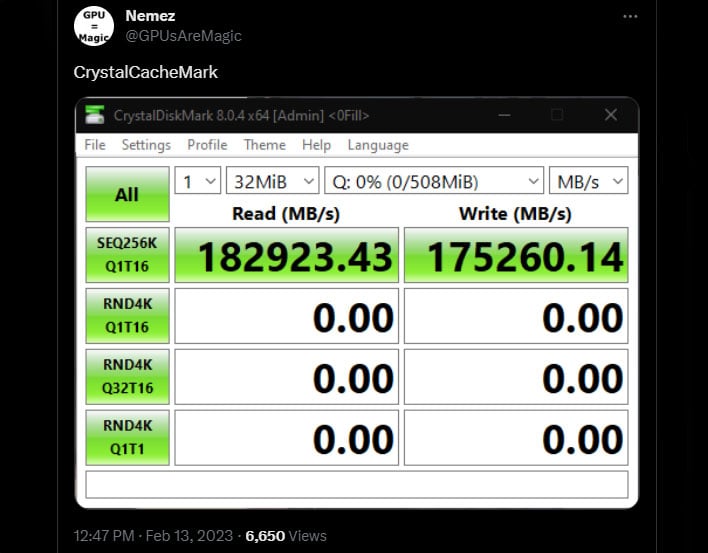AMD 3D V-Cache Turned Into A RAM Disk Destroys PCIe 5.0 SSDs In Speed Test

Storage devices have gotten really fast lately, with the fastest PCIe 5.0 SSDs getting over 14GB/s in reads and writes, but that's nothing compared to a Ryzen CPU with 3D V-Cache. Tested by hardware enthusiast and engineer Nemez all the way back in February, a Ryzen 7 5800X3D was able to hit 183GB/s and 175GB/s in reads and writes respectively, a difference of over ten times compared to cutting-edge storage.
These performance figures were achieved in CrystalDiskMark using a pretty complicated setup. Nemez used OFSMount to create an FAT32 RAMDisk, then ran CrystalDiskMark with the very specific parameters of sequential, a 256KB block size, queue depth to one, 16 threads, and the data fill set to zeroes. This was all necessary presumably due to the small size of L3 cache compared to system memory, and also because cache is normally not supposed to be tested in CrystalDiskMark anyways.

You might be surprised that cache is so fast, but that's exactly the point of it. Modern computers require both fast storage and lots of space, but there's no single type of memory that's great at both. Cache and SSDs fit into what's termed the memory hierarchy, with the smallest but fastest storage at the top and the largest but slowest storage at the bottom. Cache itself is divided into multiple levels, with L1 being the smallest and L3 being the largest in most chips, though some processors have an L4 cache that is often a type of DRAM or VRAM like on Intel's Xeon Max CPUs.
So while L3 cache (which is where 3D V-Cache fits into the hierarchy) is a ton faster than any SSD that exists today, each 3D V-Cache chip only has 64MB of storage. Even if you include the L3 cache integrated into the CPU chiplet itself, the total amount on the 5800X3D and 7800X3D is only 96MB. Although you won't be using your CPU's cache for storage ever, the above benchmark run helps attach a number to one of AMD's most celebrated innovations.
These performance figures were achieved in CrystalDiskMark using a pretty complicated setup. Nemez used OFSMount to create an FAT32 RAMDisk, then ran CrystalDiskMark with the very specific parameters of sequential, a 256KB block size, queue depth to one, 16 threads, and the data fill set to zeroes. This was all necessary presumably due to the small size of L3 cache compared to system memory, and also because cache is normally not supposed to be tested in CrystalDiskMark anyways.

You might be surprised that cache is so fast, but that's exactly the point of it. Modern computers require both fast storage and lots of space, but there's no single type of memory that's great at both. Cache and SSDs fit into what's termed the memory hierarchy, with the smallest but fastest storage at the top and the largest but slowest storage at the bottom. Cache itself is divided into multiple levels, with L1 being the smallest and L3 being the largest in most chips, though some processors have an L4 cache that is often a type of DRAM or VRAM like on Intel's Xeon Max CPUs.
So while L3 cache (which is where 3D V-Cache fits into the hierarchy) is a ton faster than any SSD that exists today, each 3D V-Cache chip only has 64MB of storage. Even if you include the L3 cache integrated into the CPU chiplet itself, the total amount on the 5800X3D and 7800X3D is only 96MB. Although you won't be using your CPU's cache for storage ever, the above benchmark run helps attach a number to one of AMD's most celebrated innovations.


